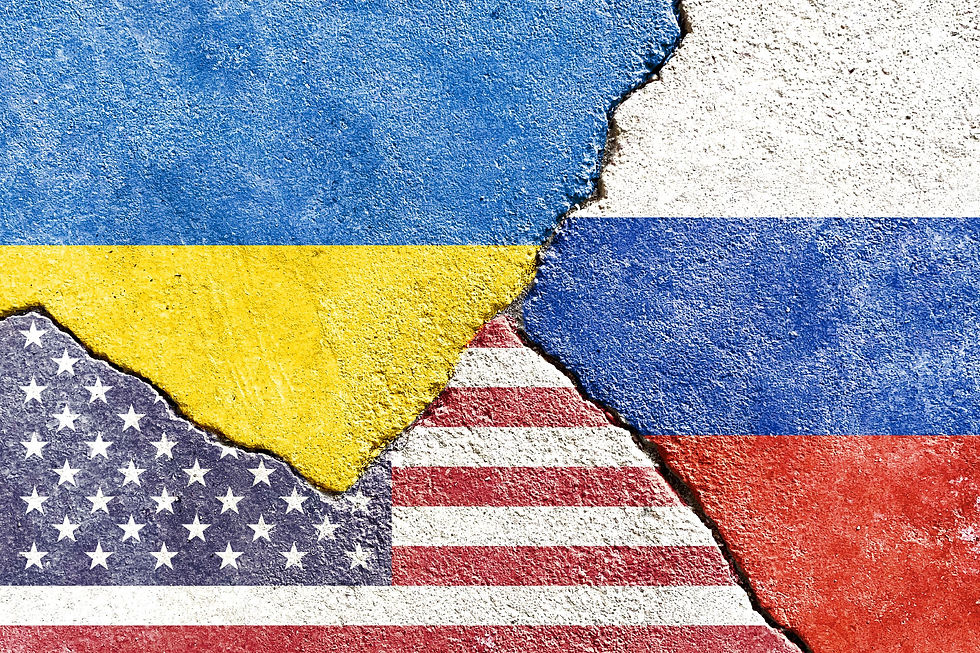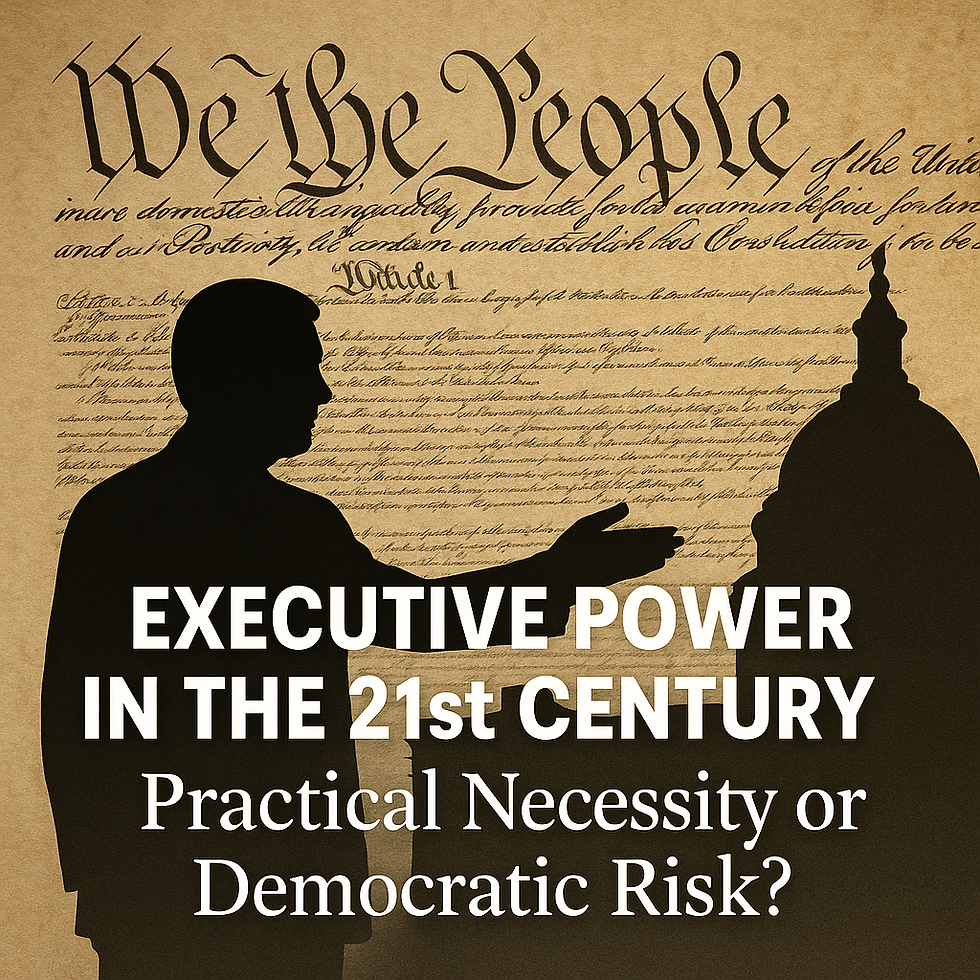Great Power Competition and U.S. Geopolitical Challenges
- Dr. Johnson -UnTangled Talk

- Jan 16, 2024
- 5 min read
I delve into this profound transformation, exploring how a potential Russian triumph could reshape the global stage, challenge the liberal world order, and compel the United States to navigate through uncharted geopolitical waters.
This blog isn't just a speculative journey; it's an essential exploration into a potential future where great power competition takes a dramatic turn. We stand at a pivotal moment where the outcome of the Ukraine conflict could set in motion a series of events, fundamentally altering America's role globally and testing the resilience of established international norms. From the corridors of Washington to the streets of Eastern European capitals, the reverberations of this conflict extend far beyond the battlefield.

Should Russia emerge victorious in Ukraine, it would pose numerous geopolitical obstacles and alter America's role globally. Additionally, I would argue a Russian victory outcome would profoundly transform great power competition dynamics, marking an inflection point in post-Cold War international geopolitics and creating significant challenges to U.S. dominance and the liberal world order principles. Undoubtedly, an overwhelming Russian victory would bolster Russia's global position and enable Moscow to assert its power projection and expand its influence into key regions like Eastern Europe and the Middle East.
An assertive Russia could force the U.S. to adapt and respond appropriately, potentially undermining American interests. NATO, led by the U.S., would also need to reevaluate its strategic focus, potentially increasing military commitments and expenditure to safeguard Eastern European Allies. As an expert in public policy, I recognize the need to explore briefly how such realignment might strain U.S. resources and compromise its capacity to address other international threats. Accordingly, I feel it necessary to briefly discuss its domestic repercussions as part of any discussion about domestic policies that could emerge under such scenarios. An optimal policy response requires striking an equitable balance between meeting international security commitments and meeting domestic needs, which has profound domestic policy ramifications.
First and foremost, increasing spending to counter Russian assertiveness would likely require reallocating significant federal resources. It could strain the U.S. budget, forcing an increase in national debt or reallocation of funds from domestic areas like healthcare, education, or border/homeland security. Diverting resources towards international security efforts may draw public scrutiny if done at the expense of pressing domestic concerns such as illegal immigration issues or rising interest rates. At its heart, public policy must allow the United States to navigate competing priorities while meeting national security obligations without undermining essential domestic welfare initiatives, which could cause national division or radical political and
Finally, when considering public and political support for foreign policy initiatives. Given the vast diversity in opinion regarding foreign intervention and military spending within the U.S. population, policymakers should engage in open and inclusive conversations with members of society regarding increased defense spending, this involves explaining its rationale as well as any expected results - something which the Biden Administration needs to improve when discussing ongoing Ukraine-Russia conflict support efforts.
Focusing on the risk associated with great power competition, via the scenario, in which Russia is seen as the victor in their conflict with Ukraine, it must then be stated that the U.S. must navigate its complicated strategic competition with China, while managing to balance any potential Russian victory in Ukraine. I would argue that balancing the threats posed by both Russia and China would require an in-depth reevaluation of U.S. foreign policy that includes tradeoffs between regions and issues. Unbearably, any victory achieved through military aggression and disrespect of international norms by Russia would present a direct challenge to the U.S. rules-based international system.
Further, it can be said that the U.S. would face challenges when reinforcing international principles amid increasingly competitive and multipolar environments. Under such conditions, there would likely be a new geopolitical landscape with significant shifts in international alliances and economic relationships. Countries, particularly smaller European ones, would have to reevaluate their diplomatic strategies and economic ties, specifically regarding energy and trade issues. In such a scenario, the U.S. must strategize effectively as changing dynamics shift, strengthening existing partnerships while managing economic repercussions associated with an increasingly isolated Russia, to the extent possible. Military and diplomatic responses should include military engagement as well as using economic, technological, and soft power resources to counterbalance Russian influence and maintain global stability. Furthermore, multilateral diplomacy must become more active, international institutions must be strengthened further while democratic values and human rights are vigorously upheld.
Implications of Ukrainian Loss and Proxy War Dynamics
As the final part of this scenario, the on-going conflict has further frayed U.S.-Russia relations, any victory for Russia postwar would only heighten tensions further, potentially ushering in another Cold War-like period that can even potentially spark World War III. Such an apparent defeat by the U.S. could inevitably spark hybrid warfare tactics like cyberattacks, disinformation campaigns, and economic warfare if adopted widely enough by opposing states. If fully adopted and utilized effectively by hostile actors worldwide, such tactics could radically redefine international conflicts into direct great power clashes that ultimately do more global harm than good.
Considerations for Future Policies:
Assuming Russia wins in Ukraine and great power competition develops further, various critical policy considerations and their consequences must come to the forefront for effective strategic planning and action to be undertaken. These policies must address not only immediate repercussions of conflict but also potential global implications that must be anticipated; accordingly, my policy proposals include these factors as potential considerations:
1. Enhancing European Defense and NATO Revitalization: I believe there is an urgent need for NATO to assess and enhance its defense strategies to respond to any shifts in Europe's security landscape, such as increasing defense spending and rapid response capabilities as well as beefing up defenses on NATO's eastern flank. In particular, the United States should lead in revising NATO strategic objectives so as to deter further Russian aggression backed up by China while providing Eastern European allies reassurance through strong military presence, joint defense initiatives, cyber defense strategies expansion is also key given its growing relevance for hybrid warfare tactics.
2. Balancing U.S.-China Relations: The United States faces two formidable challenges when attempting to balance its relations with Russia while competing with China strategically: responding to new Russian assertiveness while keeping China at arm's length as an equal competitor; this requires taking an equally balanced approach towards European and Indo-Pacific theaters by equally allocating resources and attention across these theaters; engaging China diplomatically to avoid escalated tensions while holding strong on key issues which the U.S. considers important; additionally strengthening alliances such as Quad and ASEAN partnerships will aid regional stability.
3. Reinforcing International Norms and Institutions: Any attempt by nations to undermine international laws and norms requires them to commit more forcefully to supporting these principles - this includes supporting institutions like the UN or International Criminal Court as well as advocating adherence. Diplomatic efforts should focus on building broad coalitions against unilateral actions while advocating peaceful conflict resolution through diplomacy and prioritizing multilateralism over competitive approaches toward global challenges.
4. Preparing for Hybrid and Cyber Warfare: With hybrid warfare tactics emerging as key players in Ukraine's conflict, preparedness in these domains must become part of national security strategies. Enhancing cyber defenses, developing offensive capabilities, and investing in counter hybrid weapons such as Artificial Intelligence-type weapon systems will become essential components for maintaining national security strategies in such times of warfare.


Comments